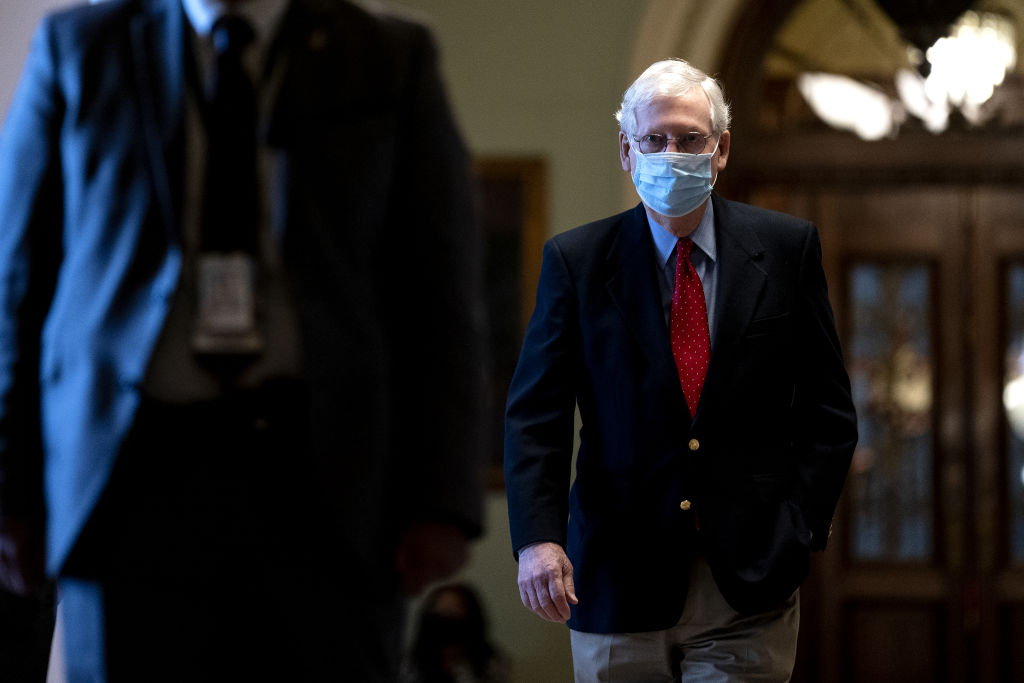
This article is part of the The DC Brief, TIME’s politics newsletter. Sign up here to get stories like this sent to your inbox every weekday.
It’s a rare thing on Capitol Hill for a lawmaker’s team to try and play down their power. But that’s what is happening right now in the Senate.
In the Joe Biden-era Senate, the balance of power is split evenly between the parties, 50-50. Vice President Kamala Harris, a Democrat and the constitutional president of the Senate, gets to break the tie in votes that fall along party lines. That makes Democrat Charles Schumer the new Senate Majority Leader, unseating his predecessor Mitch McConnell.
So that means Democrats now get to set the agenda, chair the committees and get the little perks that come with being the controlling party, like added staff and better room reservations, right? In normal times, sure. But these are not normal times. Even though Republicans don’t have a majority in the Senate any longer, under the body’s rules, the GOP still chairs some committees, the three new Senators who took their oaths this week can’t be assigned committees and McConnell can still block progress going into this two-year congressional session. Until the two parties’ leaders — or all 100 Senators on a separate track — agree to how the Upper Chamber will work for the next two years, the old rules still hold. And central to those rules, set out in a document known as an organizing resolution, is whether a lone Senator in the minority can gum up the entire agenda via the filibuster.
Senators and their aides alike are beside themselves with frustration. Schumer and McConnell have yet to agree on the power-balance agreement that typically comes without fanfare at the start of every session. It’s bland by design, a rundown of who can do what and when. But McConnell, who ran the Senate chamber for the last six years, wants Schumer to agree to keeping the filibuster in place so the out-of-power party can essentially block anything lacking 60 votes. The filibuster gives the minority party leverage and largely keeps anything from going forward along strictly partisan lines, but it’s also been a favorite boogeymen for some Democrats who have renewed their want to switch to a simple majority-rules posture.
McConnell says he merely seeks to keep things as they are, with the minority party’s rights protected. McConnell is effectively filibustering the rules changes to preserve the filibuster. Schumer, who has so far been unusually quiet about the talks, has remained non-committal. The progressives in the Democratic caucus want to trigger the so-called nuclear option and start passing routine legislation by 51-vote margins. Moderates are warning that might feel good in the short run, but the change could eventually haunt Democrats when they inevitably return to the minority. Senators like Joe Manchin, Kyrsten Sinema and Chris Murphy are none too eager to start down this road, knowing that the 2022 map may give Republicans a majority again.
Rules Committee Chair Amy Klobuchar, when asked last week about McConnell’s demand to cement the filibuster in exchange for a power-sharing agreement, reiterated the caucus’ position that these were not the conditions to have this debate. Having the filibuster in reserve gives Democrats important leverage going forward.
This wrangling is already hampering Biden’s ability to confirm members of his Cabinet. Until there is an agreement, Republicans in the committees set the agenda. They aren’t exactly looking to rush ahead with confirmation hearings for Biden’s nominees, knowing that their hold on the gavels is coming to an end. To get the gavels and move things along, Democrats may have to give up much of their power and capitulate to McConnell’s request on the filibuster.
Until there’s a new organizing resolution, folks are stuck parked in their current committee assignments — or on the outside looking in, as is the case for the three newcomers to the Senate who took their oaths on Wednesday. It’s been such a frustration that the top spokesman for incoming Senate Armed Services Committee chairman had to send a memo to reporters downplaying his boss’ power.
“Just a friendly reminder that Senator Reed is NOT the Chairman of the Senate Armed Services Committee (yet). Senator Inhofe is currently Chairman,” Chip Unruh wrote in a rare power-shedding memo. “Yes, Democrats now formally hold the Senate majority on a 50-50 split, plus VP Harris as tie breaker. And Schumer is already officially Majority Leader. But Senate committees are continuing bodies, so everyone who was on SASC last Congress and is still a Senator in the 117th Congress remains frozen in place right now.” You will seldom find anyone at the Capitol so willing to admit such a lack of power.
This story has been updated to reflect Klobuchar’s view on linking the filibuster debate to the organizing resolution.
Make sense of what matters in Washington. Sign up for the daily D.C. Brief newsletter.
More Must-Reads from TIME
- Cybersecurity Experts Are Sounding the Alarm on DOGE
- Meet the 2025 Women of the Year
- The Harsh Truth About Disability Inclusion
- Why Do More Young Adults Have Cancer?
- Colman Domingo Leads With Radical Love
- How to Get Better at Doing Things Alone
- Michelle Zauner Stares Down the Darkness
Write to Philip Elliott at philip.elliott@time.com